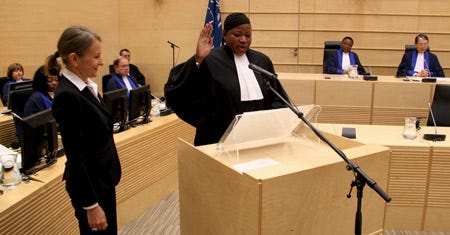21 MARCH—There are many things to say about the International Criminal Court’s decision to issue an arrest warrant for Vladimir Putin, on charges that the Russian president directed the abduction and deportation of thousands of children from eastern Ukraine in the early months of the intervention that began a year ago. Let us settle on three of these things.
Straight off the top, the ICC’s action announced on March 17 is ridiculous in any number of ways. Its legality is almost certainly illegitimate. Its premise appears to bear no relationship with reality. It will have no appreciable effect. It is a political gesture dressed up as law. And as a political gesture dressed up as law it is sheer propaganda, nothing more.
If an institution such as the ICC behaves ridiculously in these ways, it is not doing its credibility a great deal of good. To ask what use the ICC serves, despite its elevated purpose when it was founded 25 years ago, seems to be a good question.
There is a history behind this kind of conduct. This is the second thing to say about what the ICC has just done. If we study this history even briefly, we are likely to be upset, because this history indicates that the many international institutions to which humanity has looked as a source of impartial order for the past 70–odd years do not work as intended. And they were fated not to work as intended so long as the United States insists, as it has since the 1945 victories, on global dominance. This is a case of either/or: We can have a stable world order on the basis of the U.N. Charter or other such instruments of international law, or we can have the American imperium, but we cannot have both.
This leads us to the third thing to say about the ICC’s decision to issue a warrant for a head of state’s arrest. And the third thing to say is the one that seems to me to require our attention most urgently if we are to understand the world in which we live.
We must think hard now about what the political philosophers call the state of exception. This notion has a history, too, and it is a very grim one. The state of exception describes powers that make law and at the same time proclaim themselves above the law. The history of this concept runs from the Romans through the European monarchies on up to the Nazi regime.
In this last case, the Third Reich operated under a continual state of exception as against a temporary state of exception deriving from an unforeseen emergency. And to proceed to our point, the U.S. has claimed for itself a similarly continual state of exception since the early Cold War years. Its relations with the ICC are a clear manifestation of this reality.
■
There was talk among the Western powers for most of last year, readers may recall, of the U.N. forming a special court to try Putin and other Russian officials on charges of war crimes allegedly committed in the course of the Ukraine conflict. But Washington and its allies overestimated international sentiment: They could get no useful degree of support among member states for any such project. They similarly failed when, as an alternative, they tried to get the U.N. General Assembly to authorize the ICC, a U.N. body, to investigate the numerous allegations of war crimes leveled since the start of hostilities in February 2022.
It was at this point that the West—reportedly led by Britain—began an intense lobbying campaign at The Hague to get the ICC to act even without a U.N. referral behind it. The arrest warrant announced last Friday appears to be the result of this pressure.
Keep reading with a 7-day free trial
Subscribe to The Floutist to keep reading this post and get 7 days of free access to the full post archives.


